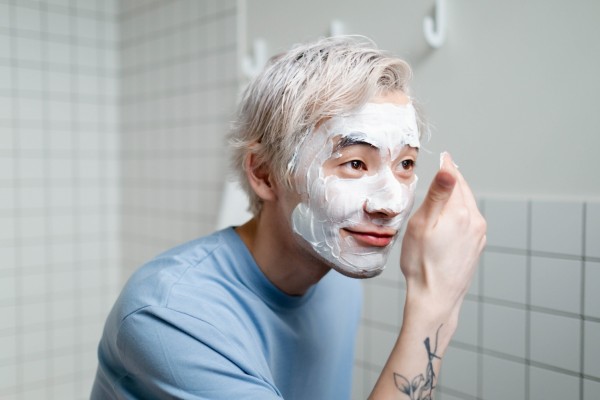In conversations about skincare, women are often the first demographic that comes to mind. The beauty and skincare industry has traditionally focused its marketing and product development on women, creating a cultural association between femininity and skincare.
However, the reality is that breakouts, sun damage, and other skin issues are not gender-specific, so men deserve their own skincare routines. Mere water and soap might not suffice, especially for those not naturally blessed with easy-to-manage skin.
 (Photo : Pexels/Ron Lach)
(Photo : Pexels/Ron Lach)
Men's skin vs. women's skin
In a YouTube video, Seattle-based board-certified dermatologist Dr. Daniel Sugai said, "There's no real big difference between" men and women's skin. But there are still some differences.
Every skin is different, regardless of gender, but men's skin is generally thicker than women's.
According to Dermalogica, androgen or testosterone stimulation causes an increase in skin thickness, resulting in men's skin being approximately 25% thicker than women's.
In addition to being thicker, a man's skin also has tougher texture.
A man's skin is also typically oilier and has larger pores than a woman's. It's because men have more active sebaceous glands than women, according to Eucerin.
"I don't want to generalize too much, but in general, men tend to have a little bit more oily skin," Dr. Sugai explained.
"We [men] have more of a tendency of sebaceous glands," the dermatologist added. "We [men] get a lot of body acne as well on the face not just through puberty but also in adulthood after a workout."
Sebaceous glands are tiny glands found in your hair follicles that secrete an oily substance called sebum, which protects your skin from drying out.
Sebum production in men is double that of women, according to Eucerin. This excess oil production often leads to a shinier complexion in men and sometimes makes them more prone to issues like acne and clogged pores. This is also why men have longer-lasting acne, according to Dermalogica.
Men's skin also boasts more collagen compared to women. The higher density of collagen contributes to slower aging in male skin than female skin.
Dr. Neal Schultz, a highly regarded clinical professor of dermatology in New York City, said on his YouTube channel that male skin seems to age at a slower rate than female skin due to three main reasons: the more regular exfoliation caused by shaving among men, the thicker nature of men's skin owing to higher levels of testosterone, and the decline in estrogen levels as women age.
Basic step-by-step skincare routine for men
The essential steps of a skincare routine remain the same, whether it's a man's or a woman's.
Step 1: Cleansing
Cleansing is the first step to any skincare routine. It removes dirt and pollution that have accumulated on the surface of the skin, which could cause a number of skin problems, according to Biologique Recherche U.K.
As mentioned above, men often have larger pores and produce more oil, potentially leading to increased acne and breakouts. Hence, the most suitable face wash for men should aim to eliminate oil or manage pores effectively.
Step 2: Exfoliating
Exfoliating two to three times a week is recommended for a thorough cleanse, effectively removing dead skin cells, unclogging pores, and reducing excess sebum.
This step can also lead to softer skin and a brighter, more vibrant complexion, according to an article published by Watsons.
Step 3: Moisturizing
According to Hale Cosmeceuticals, men typically don't moisturize their skin as often as women. However, this doesn't mean that their skin needs any less hydration.
As men commonly have oily skin, choosing a water-based moisturizer is advised as this is significantly lighter than an oil-based one and would give the hydration that your skin needs without adding extra oil.
Step 4: Applying sunscreen
While men's skin seemingly ages slower than women's, this doesn't negate the necessity for sunscreen in men's skincare routines. Sunscreen remains a critical final step in daytime skincare, guarding the skin against UV radiation, which could cause wrinkles, hyperpigmentation, and skin cancer.

